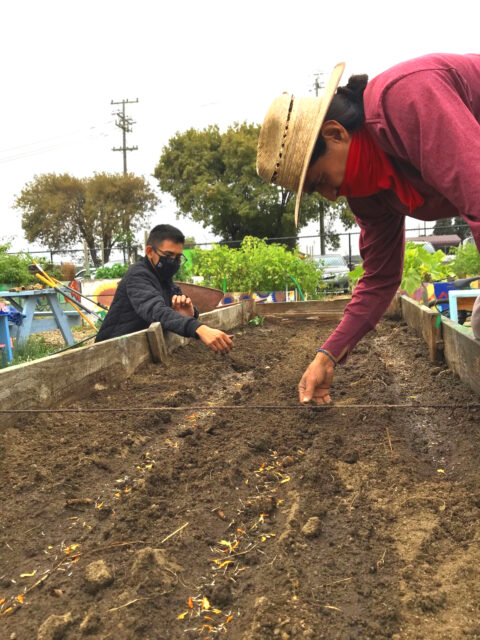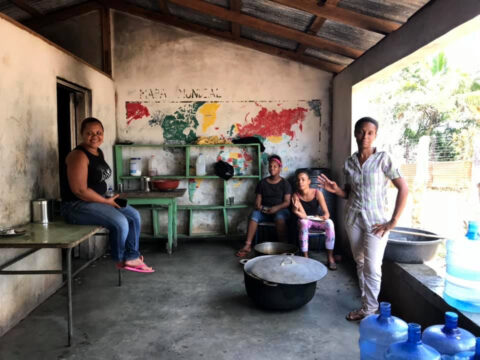Above: Photo by Eva Katalin Kondoros, Getty Images
Environmental activist Michelaina Johnson was shocked to learn that a high school in Watsonville has traces of Chromium-6, a known carcinogen, in the water.
“It’s the year 2020 and students can’t drink from the fountains?” said Johnson, who is pursuing a Ph.D. in environmental studies at UC Santa Cruz. “What can we as a community do about this problem?”
This is the kind of inquiry that drives 2019–2020’s passionate, imaginative, and a hard-working cohort of 10 UC Santa Cruz undergraduates and graduate students who have received Global and Community Health Wellbeing Awards designed to train and empower the next generation of global and community health leaders through hands-on research.
The program is offered through the Institute for Social Transformation, which was instrumental in supporting and facilitating the well-being awards.

In addition to growing corn, squash, and other foods, gardeners Efren Lopez (Cowell ’21, political science and government) and Hugo Sanchez of River Park Garden in Watsonville began the process of sowing the seeds of the cempasuchitl (marigold) flower in July in preparation for November Día de los Muertos celebrations with the local community and youth. —Photo by Carmen Cortez
Each fellow is required to complete a project that addresses community health in local communities near the campus, or abroad, with a strong emphasis on collaboration between the students, community groups, and nonprofit organizations.
The fellowships, a pilot program, are part of the university’s new global and community health program, which coordinates university-wide community and global health research efforts. That health program also offers a multidisciplinary bachelor of arts degree and a bachelor of science degree.
Johnson, one of the fellows, worked closely with the Community Water Center, an environmental advocacy nonprofit group, to help buy reusable water bottles for the high school students. The students couldn’t use the drinking fountains, so the school had arranged for regular shipments of bottled water to the campus—an effort that provided students with safe drinking water, but also created a lot of waste from the disposable Dixie cups the students used.
Over the summer, the school installed reverse-osmosis water filters on campus so the students can use the water fountains when they return.
Johnson also designed and illustrated a brochure that the Community Water Center will distribute to schools throughout California, showing students the best sanitation practices for reusable water bottles. This project fits within the broader framework of Johnson’s research, which focuses on water rights, water conservation, and equitable access to clean drinking water. Among her recent projects is a detailed study focusing on “the disparity in access to clean drinking water in the Salinas and Pajaro valleys.”
Many of the fellowship projects, including Johnson’s, have a strong local focus, and involve partnerships with community organizations.
“I wanted to make sure all the learning, work, and research I do has a community service component,” Johnson said. “It is really easy for graduate students to become siloed, to wind up in your own little echo chamber of thoughts and ideas. This was a way for me to connect and do meaningful work on a project I believed in.”
Johnson praised the focus and commitment of the other fellows in her program. The full list shows their wide range of disciplines, ranging from computational media to Latinx studies; psychology; politics; community studies; and molecular, cell, and developmental biology.
“When I sit in on the meetings with the Global Health fellows, there is a sense of passion and deep care for the local communities,” Johnson said. “There is a certain amount of physical separation between the UC Santa Cruz campus and the surrounding communities. If you can bridge that, there is a lot of power there. A lot of people in the program share a ‘grow where you’re planted’ philosophy. Serve where you are physically.”
Global reach, local impact

Nancy Chen is a professor of anthropology and the former department chair. —Photo by Tom O’Leary
Anthropology professor Nancy N. Chen, the founder of the fellowship program, also recognizes the essential connections between community issues and worldwide health concerns.
“The international context is very important when we’re thinking about global health issues,” Chen said. “But we also need to think about what is happening here around us. Global health can be so much stronger when we work closely with and have the support of diverse community members.”
Chen’s background as a medical anthropologist informs the philosophy behind the fellowships. Much of the research that she does is based on and grounded in ethnographic field research, “the kind of work where we are engaged with communities, talk to people and listen. The power of listening is critical to well-being. It’s listening with care. You listen and then transform the knowledge that people are willing to share with us. You turn that into a broader research framework, analyzing institutions, governance, and policy, and hopefully making a difference.”
She said that the catalyst for the fellowships was her strong desire to immerse her students in the kind of meaningful fieldwork and communication that can improve health and well-being across the globe as well as in communities where students wish to return and contribute after their university education.
“As a medical anthropologist, I’m trained to study health inequalities through cultural lenses. GCH Wellbeing Fellows focus on well-being as a way to address health equity,” Chen said. “The initial catalyst for the pilot program was not the pandemic, but the pandemic opened people’s eyes to the importance of well-being not only as a foundation for individual bodies, but also for society and communities.”
Chen has been teaching at UC Santa Cruz since 1994. In that time, she’s come to understand the transformative power of research mentorship and knowledge production. She believes so strongly in the fellowships and the students’ work that she devoted all $15,000 of her annual research stipend as associate dean for Health, Wellbeing and Society to funding the student projects. The first cohort of fellows was named in 2019.
“In such times, we have to show by doing, and it’s important to put resources where one’s values and beliefs are,” Chen said. “That amount might not seem like much—$15,000 for 10 fellows. But the initial support for building a GCH network makes such a difference in students’ research and career trajectories.”

Chicha (left), Dania (middle-left), Hanny (middle-right), and Nena (right) prepare lunch for the visiting doctors and nurses with an American-based medical mission that visits their area to provide primary care services to populations along the Dominican-Haitian border twice yearly. Lucia Vitale, a graduate student in the Politics Department, has been investigating the fragmented health-care system in the Dominican Republic. —Photo by Lucia Vitale
Chen hopes that broader attention to the program will lead to sustained funding and a future endowment.
The COVID-19 crisis has had a profound influence on several of the fellowship projects, and two of them directly address the crisis. Aarushi Saharan (Rachel Carson ’21, molecular, cell, and developmental biology) and Manya Balachander (Rachel Carson ’21, psychology and community studies) have been tracking how women who are houseless accessed reproductive health-care services prior to and during the pandemic in Santa Cruz County. In a summary of their project, Saharan and Balachander spoke of the difficulty these women face in finding health-care services. The students found that the problem wasn’t necessarily a lack of services. Instead, many of the women felt overwhelmed trying to navigate the system in the midst of the pandemic to find the services they needed.
While many of the GCH Wellbeing Fellows conducted research prior to the pandemic, many had to pivot and revise their research due to quarantine. One fellow, Lucia Vitale, a graduate student in the Politics Department, had to postpone her travel to the Dominican Republic, where she has been investigating the health-care system, but she was able to go at a later time. Efren Lopez (Cowell ’21, politics and sociology) had to recalibrate his approach, but he is continuing as a fifth-year student to work on his research in Pajaro Valley with agricultural workers.
A wide array of skills and disciplines
Like Michelaina Johnson, Aysha Peterson, also a graduate student in the Environmental Studies Department, is taking on water-quality issues. But Peterson’s focus is on the struggle for clean water supplies in the midst of nitrate run-off from fertilizer use in the Salinas Valley, California.
“When I moved here to California’s Central Coast, I met some water justice activists who taught me about how nitrogen fertilizers are leaching through the soil profile and contaminating precious aquifers, leaving many rural communities without clean water,” Peterson said.
Their stories encouraged Peterson to work with several Salinas Valley farmers whose small-scale, agriculturally diversified farms offer a powerful alternative to the massive industrialized farming operations that dominate the region.
This fellowship has given Peterson a chance to pursue research activities with these farmers, including the creation of five short videos that highlight their efforts to support soil health and protect regional water quality.
“The fellowship also connected me with other UC Santa Cruz scholars who promote a broader conceptualization of health that moves beyond individual bodies to consider the health of the land and water,” Peterson said.
The work has been difficult but rewarding.
“Doing research that is helpful and practical is no small task,” Peterson said. “It requires me to build meaningful relationships with community members, a process that takes time, dedication, humility, and a willingness to be transformed by those relationships.”
It’s hard to complete such work while pursuing a Ph.D. with its many deadline constraints, “but these relationships give me life—they are the way that I remember my priorities, and they are the way that I am held accountable to making meaningful material change,” Peterson said.
Tech with a heart

A user exercises with Aviv Elor’s Project Star Catcher on the Cave Automatic Virtual Environment (CAVE), a holodeck-like virtual reality chamber located in the UC Santa Cruz Baskin School of Engineering. Elor is exploring how traditional physical therapy methods can be translated into immersive virtual reality games for greater accessibility, affordability, and accuracy of treatment in a way that is fun and engaging. —Photo by Aviv Elor
The program also provides support and encouragement for fellows who have turned to the world of cutting-edge technology to address global health challenges on an intimate scale.
Aviv Elor (Crown ’19, robotics engineering), a Ph.D. student in UC Santa Cruz’s Department of Computational Media, is designing immersive virtual reality games to help with the physical rehabilitation of stroke patients and others overcoming impairments.
He fell into this line of research after rupturing the triceps ligament in his right arm and having to get reconstructive surgery.
“At the time, I was an undergraduate at UC Santa Cruz, right when consumer virtual reality was blowing up, and [consumer electronics company] the HTC Corporation released new and more affordable headsets,” he said.
These days, Elor has been spending his time interviewing over 100 health professionals to learn more about the challenges of helping patients with physical therapy, especially with the impact on communities by the global pandemic.
He’s also working with researchers from UC Santa Cruz’s ASSIST Lab, which which develops socio-technological solutions that create opportunities for access to learning and accessing technology.
He said the fellowship program has done much more than just support his research.
“I was also able to learn from the other amazing fellows, and better understand the need for equitable health technologies and community collaboration to try to solve some of our most pressing problems in health today,” said Elor.
The pilot program is continuing in 2020–21, and some of the inaugural GCH Wellbeing Fellows may help mentor new incoming fellows. If readers and community members are interested in contributing their knowledge, sharing resources, or collaborating with GCH Wellbeing Fellows, please contact Nancy N. Chen at nchen@ucsc.edu or the Institute for Social Transformation at transform@ucsc.edu.

